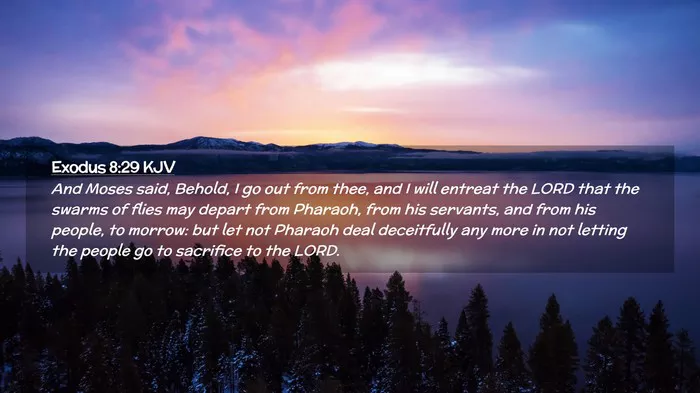Read the Daily Bible Verse – Exodus 8:29 To Strengthen Your Spiritual Journey.
Exodus 8:29 is a key verse within the narrative of Moses negotiating with Pharaoh during the plagues of Egypt. It demonstrates Moses’ role as a mediator between God and Pharaoh and highlights Pharaoh’s insincere promises. In the King James Version (KJV), the verse reads:
“And Moses said, Behold, I go out from thee, and I will intreat the LORD that the swarms of flies may depart from Pharaoh, from his servants, and from his people, to morrow: but let not Pharaoh deal deceitfully any more in not letting the people go to sacrifice to the LORD.”
This verse encapsulates themes of accountability, divine mercy, and human defiance, making it a rich subject for theological reflection and practical application.
The Context on Exodus 8:29 KJV
Historical Background
The events of Exodus occur during the Israelites’ enslavement in Egypt, where God sends Moses to demand their release. Pharaoh’s repeated refusal to free the Israelites prompts God to send a series of plagues, each progressively demonstrating His power and sovereignty over Egypt’s gods and Pharaoh’s authority.
Immediate Context
Exodus 8:29 is part of the narrative surrounding the fourth plague—swarms of flies (Exodus 8:20-32). After enduring the plague, Pharaoh summons Moses and offers to allow the Israelites to worship their God but only within Egypt (v. 25). Moses rejects this offer, citing the need for a complete separation. Pharaoh relents and promises to let the Israelites go, but Moses, knowing Pharaoh’s history of deceit, warns him not to renege on his word.
The Meaning of Exodus 8:29
A Call for Sincerity
Exodus 8:29 highlights Moses’ role as both an advocate for the Israelites and a spokesman for God. His warning to Pharaoh underscores the importance of sincerity in dealing with God. Pharaoh’s repeated false promises reflect a lack of genuine repentance or respect for God’s authority.
God’s Mercy and Judgment
Moses agrees to intercede with God to remove the flies, showcasing God’s willingness to extend mercy even to an obstinate ruler. However, the verse also carries a warning: God’s patience is not infinite, and continued deceit will result in further judgment.
Mediation and Responsibility
Moses’ act of intercession serves as a foreshadowing of Christ’s role as the ultimate mediator. It also emphasizes human responsibility in responding truthfully to God’s commands. Pharaoh’s deceit contrasts sharply with Moses’ faithfulness, offering a stark lesson on the consequences of defiance.
Exodus 8:29 Application in Life
The Importance of Integrity
Pharaoh’s deceit serves as a cautionary tale about the dangers of insincerity. In life, honesty and integrity are essential in our relationship with God and others. Deceit undermines trust and leads to further consequences.
The Power of Intercession
Moses’ willingness to intercede for Pharaoh, despite Pharaoh’s obstinacy, reflects God’s call for believers to pray for others, even those who oppose or mistreat them. Intercessory prayer is a powerful act of love and faith.
Accountability Before God
This verse reminds believers that God sees beyond outward actions to the intentions of the heart. It is a call to examine our motives and ensure that our commitments to God are genuine.
Comparison with Other Biblical Texts
Old Testament Parallels
Numbers 23:19: “God is not a man, that he should lie,” contrasts with Pharaoh’s deceitfulness, reinforcing the faithfulness of God in keeping His promises.
Proverbs 12:22: “Lying lips are abomination to the Lord,” aligns with Moses’ warning against deceit.
New Testament Teachings
Matthew 5:37: Jesus instructs His followers to let their “yes” be “yes” and their “no” be “no,” echoing the call for sincerity seen in Exodus 8:29.
2 Corinthians 5:20: Paul describes believers as ambassadors of Christ, tasked with reconciling others to God, much like Moses’ role as mediator.
Themes of Mercy and Judgment
Jonah 3:10: God’s mercy toward Nineveh when they repent contrasts with Pharaoh’s hardened heart.
- Romans 2:4-5: Paul warns against taking God’s kindness for granted, a lesson evident in Pharaoh’s repeated insincerity.
Modern-Day Relevance
Dealing with Hard-Heartedness
Exodus 8:29 is particularly relevant in situations where we encounter resistance or insincerity. Believers can find encouragement in Moses’ persistence and God’s ultimate justice.
Living with Integrity
Pharaoh’s deceit serves as a warning to individuals and leaders alike about the importance of keeping one’s word. In today’s world, where trust is often undermined, this verse calls believers to uphold honesty and faithfulness in their commitments.
The Role of Advocacy
Moses’ intercession for Pharaoh reminds modern Christians of their responsibility to advocate for others, particularly through prayer. This includes praying for leaders, even those whose actions oppose God’s will.
Conclusion
Exodus 8:29 is a rich and multifaceted verse that speaks to themes of sincerity, accountability, mercy, and judgment. It challenges believers to live with integrity, trust in God’s justice, and persist in prayer and advocacy, even in the face of opposition.
As we reflect on this verse, may we be inspired to uphold honesty in our commitments, intercede for others with faith, and trust in God’s ultimate sovereignty over every situation. By learning from Moses’ example and Pharaoh’s failures, we can grow in our relationship with God and live as faithful witnesses to His truth and mercy.
Exodus 8:29 Commentary
Jewish Perspectives
Jewish commentators, such as Rashi, emphasize Pharaoh’s hardened heart and his repeated failures to honor his promises. They see this as a demonstration of human obstinacy in the face of divine power.
Christian Interpretations
Christian theologians often draw parallels between Moses’ mediation and Christ’s role as the ultimate intercessor. They also highlight the patience and mercy of God, juxtaposed with the inevitability of His judgment.
Practical Insights
Commentaries frequently point to Moses’ courage and persistence as a model for believers today. His willingness to confront Pharaoh and trust God’s plan offers a powerful example of faith in action.
You Might Be Interested In:

